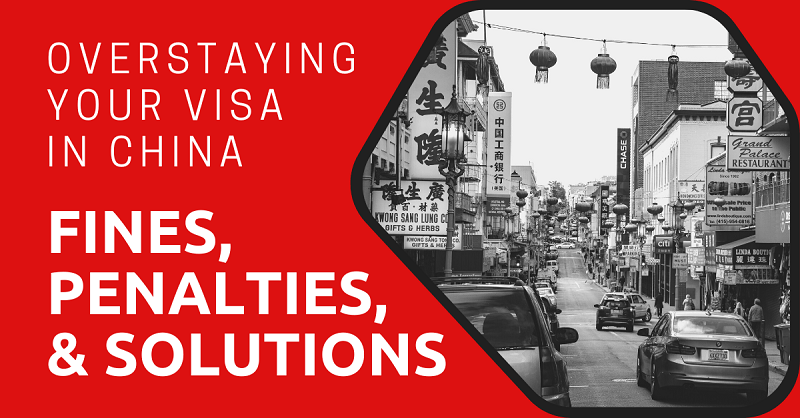
China controls who can enter the country and how long they can stay. And visitors need to be granted a visa which they apply for in advance. If you haven’t left the country by the time your visa or residence permit expires, you are an “overstayer”. The consequences can be very serious, and it’s important to know how long you are permitted to stay and what to do if you overstay by accident.
This article will take approximately 10 minutes to read. Don't have the time right now? No worries. You can email the ad-free version of the article to yourself and read it later!
Disclaimer: This article may include links to products or services offered by ExpatDen’s partners, which give us commissions when you click on them. Although this may influence how they appear in the text, we only recommend solutions that we would use in your situation. Read more in our Advertising Disclosure.
Contents
- Is Overstaying a Criminal Offense in China?
- How Much is the Penalty Fine for Overstaying?
- Can I be Deported from China?
- What if I Overstay by Accident?
- What if the Overstay is My Employer’s Fault?
- How Long Does a China Visa Last?
- What Happens When My Visa Expires in China?
- Who Doesn’t Need a China Visa?
- Now, on to You
Is Overstaying a Criminal Offense in China?
Yes. Absolutely. China takes border control very seriously, and overstaying can lead to a fine, deportation, even imprisonment; and it can impact on your ability to get a visa to enter the country in the future.
Even if you are only visiting China short-term and have no intention of returning, you can be prevented from leaving until you have paid your fine, which can lead to missed flights, expense, and inconvenience.
How Much is the Penalty Fine for Overstaying?
The fine for overstaying is RMB 500 per day (around USD 75), up to a maximum of RMB 10,000 (USD 1500). This needs to be paid in cash or with a local Chinese card; you can’t use a foreign bank card, and if you can’t pay you will not be allowed to leave until the fine is cleared. If you have overstayed by less than a month, these are likely to be the only consequences.
Can I be Deported from China?
Miss your departure date by more than a month, and the consequences become much more serious. You can be held for five to 15 days in a detention center, and then deported. You might also be banned from entering China for up to ten years, and the information about your ban will be available on an international database, potentially affecting your ability to visit other countries.
There are a few times when exceptions are granted. Some temporary latitude was allowed to foreigners in Shanghai whose plans were disrupted by the lockdowns of 2022, but those were very much special circumstances. Don’t trust anyone else’s stories of getting away with overstaying: they may have more guanxi (useful connections) than you, or may just have gotten lucky. It’s not worth taking the chance.
What if I Overstay by Accident?
If you realize you have overstayed, you need to take action immediately. It’s human nature to want to bury your head in the sand and hope the problem will go away, but things will only get worse the longer you leave it.
You should notify your employer or educational institution, then report to the nearest Public Security Bureau at the first opportunity. Be polite, and apologetic; Chinese officials do not respond well to anger or disrespect, but you may get a more sympathetic hearing if you present yourself with humility.
Explain what has happened, and make it clear that you have come to put things right. If you can expect a fine (see above), it is worth bringing the correct amount of cash to clear it immediately. However do not under any circumstances offer a bribe to any official!
Beyond this, you are in the hands of the authorities, and have little control over the situation. If you have a good excuse and have missed the date by less than a month, you may get off with just a fine and a stern word from the PSB.
If you have overstayed a month or more it might be worth taking legal advice, but it’s probably the end of your Chinese adventure.
What if the Overstay is My Employer’s Fault?
It does not matter. Follow the steps above and visit the PSB as soon as possible with your employer representative or HR person accompanying you to explain the situation. However the fines, the blacklisting, the detention, the deportation… all of that is still on the cards.
In the case of a friend to this writer, a woman trusted her employer (a school) to do the yearly visa renewal. She gave her Australian passport to the school’s visa and HR person 2 weeks in advance. The visa expiration date came and went, the woman was assured her passport was still with authorities.
10 days after she knew the visa expired, she still did not have her passport back and started to make a fuss, after pestering the management for days, finally the HR woman broke down and admitted that she did not know how to do the visa renewal and the passport had been in her desk draw the whole time. She was too scared of losing face and getting fired to admit she messed up.
Even with support and an admission of guilt from her international school behind her, the woman was taken to a room in the basement of the PSB, interrogated, and forced to sign documents all in Chinese admitting guilt.
After paying the fine, she was issued a temporary visa extension and told to go to Hong Kong to reapply for a visa.
From then on, every visa she got took longer than normal, required extra interviews, extra fees, and was rejected by China Visa Application Service Centers and deferred to Chinese consulates for special consideration because of the permanent black mark against her name.
There is no excuse for overstaying that Chinese authorities will accept.
How Long Does a China Visa Last?
The length of stay allowed by your visa depends on what kind of visa it is. Visas which allow longer stays usually need to be exchanged for residence permits, but the same rules on overstaying beyond the expiry date apply.
Tourist (L) visas are valid for between 30 days and 90 days, depending on the details of your trip. M visas are issued for business trips of up to 15 days. Work (Z) visas are only valid for 30 days, and need to be exchanged for a residence permit which will last for a year.
Other categories of visas / permits likely to apply to expats are subdivided into short stay (up to six months) or long stay (over six months). So, student (X) visas are divided into X1 (over 6 months) and X2 (less than 6 months). Similarly, journalists are issued J2 visas for short assignments and J1 visas for longer stays.
You can and should expect help from your employer or educational establishment in applying for the relevant permits, but legally you are solely responsible for keeping your documentation up to date, and making sure you leave the country when you are supposed to.
What Happens When My Visa Expires in China?
You must leave China before the expiry date of your visa or residence permit. Note that it’s your scheduled departure time which needs to be within the visa period, even if you actually pass through border control earlier (e.g. for a flight shortly after midnight). The good news is that if your flight is delayed, and this takes you beyond your expiry date, you will not be considered to have overstayed.
Who Doesn’t Need a China Visa?
The main reason you may be able to enter China without a visa is if you are in transit to another destination.
Travelers who are not leaving the airport, and have a valid ticket for a connecting flight within 24 hours of arrival, don’t pass through border control and so don’t need any other documentation than their passport and ticket.
At major airports, you can explore the local region for a limited period. This can be a great way to sample what China has to offer as a short stopover. Be aware that you need to notify your airline in advance that you want to take advantage of this exemption; although you don’t need a visa, you’ll still need the right paperwork.
Holders of any passport can apply for a 24 hour exemption, regardless of where they enter China. Longer exemptions are dependent on your nationality and port of entry.
Citizens of 53 countries can apply for a 72 or 144 hour visit. These include the US and Canada, the UK and most other European countries, Australia and New Zealand. No African countries are currently eligible, nor are India, Pakistan or Bangladesh.
The 72 hour exemption applies to visitors arriving in Changsha, Guilin or Harbin. The following cities offer a 144 hour stay: Beijing, Tianjin, Shijiazhuang, Qinhuangdao, Shanghai, Hangzhou, Nanjing, Shenyang, Dalian, Qingdao, Chengdu, Xiamen, Kunming, Wuhan, Guangzhou, Shenzhen, Jieyang, Chongqing, Xi’an, and Ningbo.
Another visa exemption allows you to stay for up to 30 days on the tourist island of Hainan. This is intended to encourage people to consider China as a destination for a beach holiday, and is open to citizens of the same 53 countries plus another six Asian countries, including Indonesia and Malaysia.
Holders of passports from Japan, Brunei and Singapore can enter without a visa for up to 15 days for the purposes of tourism, business, or visiting friends or family (though not for work or study.) And of course if you’re lucky enough to hold Permanent Residence status–the “Chinese Green card”, you don’t need a visa at all, although you do need to renew your status every ten years.
Now, on to You
Wherever you go in the world as an expat, it’s important to obey local laws and immigration procedures, and nowhere is this more true than China. Some countries offer more latitude, and in some places it is possible to smooth over difficulties with a small gift to an official, but in China respect for the law is paramount. A stay in a detention center, even for a few days, is not a pleasant experience.
If you do run into difficulties with your visa or permit, you should own up immediately and try to put things right. Better still though, put a reminder on your phone or computer several weeks before the expiry date, so that you can get your documents renewed in plenty of time!
If you trust an agent, HR person, employer, school, or whomever else with your passport and you do not get it back before the visa or residence permit expires, go directly to the PSB and report the situation so there is evidence of you trying to do the right thing.







Visa and overstay
Psb official in china nabbed me in
2016 on the premise of 18 month overstay.
Detained for 2 months
I paid for my return ticket
No overstay stamp on my passport
Based on this scenario, what are the chances for visa approval to china and/or other countries. Its now 7 good years since deportation. Kindly advice.
Thank you.
Hi Francis,
Honestly, no one really knows about it. The only way to know is to try to apply for a visa again. But it case this happens to me, I will wait for at least 10 years, which is 2026 in this case, and try to get the visa again.